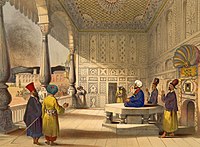
Back الحرب الإنجليزية الأفغانية الثانية Arabic İkinci ingilis-əfqan müharibəsi (1878-1880) Azerbaijani ایکینجی اینگیلیس-افغان ساواشی (۱۸۷۸-۱۸۸۰) AZB দ্বিতীয় ইঙ্গ-আফগান যুদ্ধ Bengali/Bangla Segona guerra anglo-afganesa Catalan Zweiter Anglo-Afghanischer Krieg German Β΄ Αγγλοαφγανικός Πόλεμος Greek Segunda guerra anglo-afgana Spanish جنگ دوم افغان و انگلیس Persian Toinen afgaanisota Finnish
| Second Anglo–Afghan War | |||||||||
|---|---|---|---|---|---|---|---|---|---|
| Part of the Great Game | |||||||||
 92nd Highlanders at Kandahar. Oil by Richard Caton Woodville Jr. | |||||||||
| |||||||||
| Belligerents | |||||||||
|
| |||||||||
| Commanders and leaders | |||||||||
|
| ||||||||
| Casualties and losses | |||||||||
|
Total: 10,000 dead[6]
|
Total fatalities are unknown
| ||||||||
| History of Afghanistan |
|---|
 The palace of the emir in 1839 |
| Timeline |
The Second Anglo-Afghan War (Dari: جنگ دوم افغان و انگلیس, Pashto: د افغان-انګرېز دويمه جګړه) was a military conflict fought between the British Raj and the Emirate of Afghanistan from 1878 to 1880, when the latter was ruled by Sher Ali Khan of the Barakzai dynasty, the son of former Emir Dost Mohammad Khan. The war was part of the Great Game between the British and Russian empires.
The war was split into two campaigns – the first began in November 1878 with the British invasion of Afghanistan from India. The British were quickly victorious and forced the Amir – Sher Ali Khan to flee. Ali's successor Mohammad Yaqub Khan immediately sued for peace and the Treaty of Gandamak was then signed on 26 May 1879. The British sent an envoy and mission led by Sir Louis Cavagnari to Kabul, but on 3 September this mission was massacred and the conflict was reignited by Ayub Khan which led to the abdication of his brother Yaqub.[8]
During this period, Abdur Rahman Khan, an opponent of the British, began distinguishing himself as a possible successor candidate to become the Amir of Afghanistan through his exploits in northern Afghanistan. Eventually after moving on Kabul, he was crowned and then later recognized by the British as the ruler of Afghanistan.[9]
The second campaign began when Ayub Khan, the governor of Herat, rebelled in July 1880 and marched on Kandahar, defeating the British at the battle of Maiwand. The campaign ended in September 1880 when the British decisively defeated Ayub Khan outside Kandahar. Abdur Rahman Khan, now the sole ruler, created the buffer the British wanted between the Raj and the Russian Empire. British and Indian soldiers then withdrew from Afghanistan.[10]
- ^ Schmidt, Karl J. (1995). An Atlas and Survey of South Asian History. M.E. Sharpe. p. 74. ISBN 978-1563243332.
British forces were victorious and Sher Ali was deposed
- ^ Lee 2019, pp. 382–383.
- ^ Lee, Jonathan (2019). Afghanistan: A History from 1260 to the Present. Reaktion Books. p. 383. ISBN 9781789140101.
- ^ Lee 2019, p. 378.
- ^ Blood 1996, pp. 20–21.
- ^ Robson 2007, p. 297.
- ^ a b Robson, Brian. (2007). The Road to Kabul: The Second Afghan War 1878–1881. Stroud: Spellmount. p. 299. ISBN 978-1-86227-416-7.
- ^ Chisholm, Hugh, ed. (1911). . Encyclopædia Britannica. Vol. 28 (11th ed.). Cambridge University Press. p. 898.
- ^ Lee 2019, pp. 378–379.
- ^ Barfield 2010, p. 145.